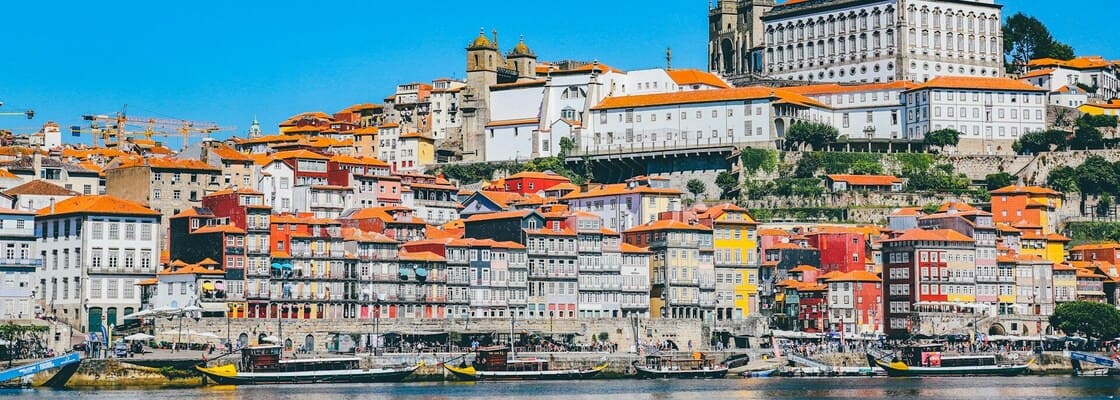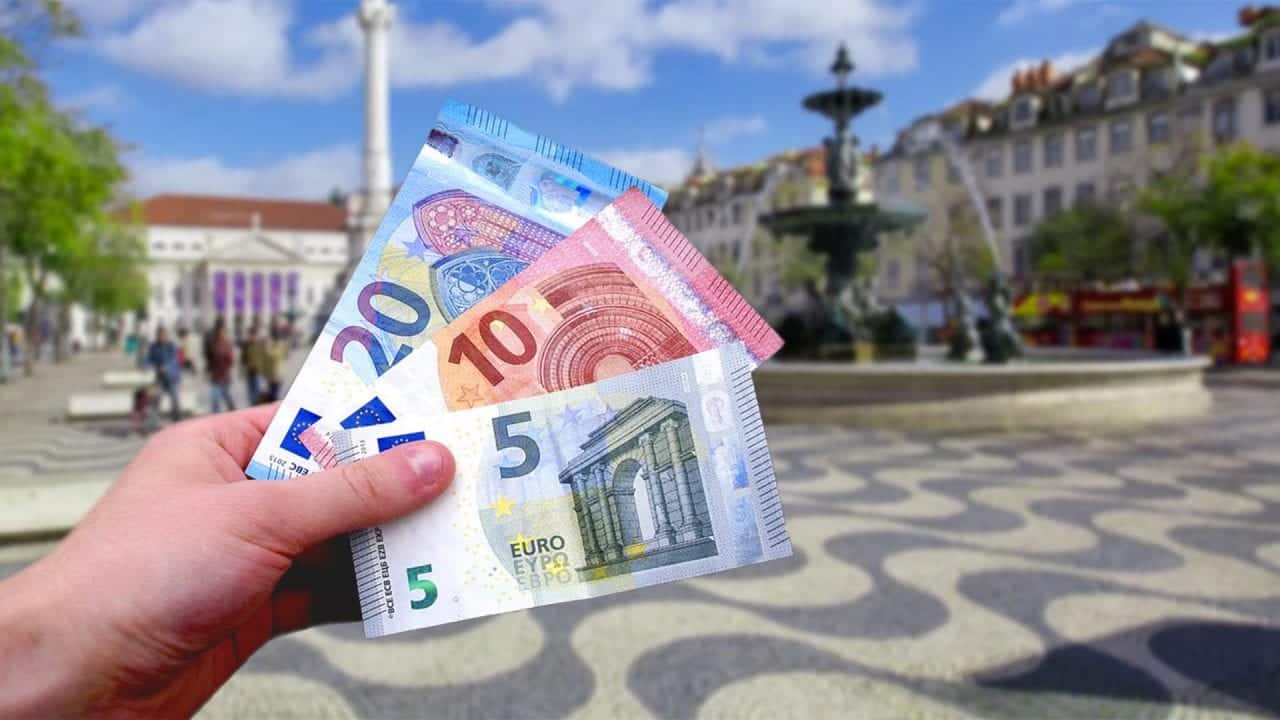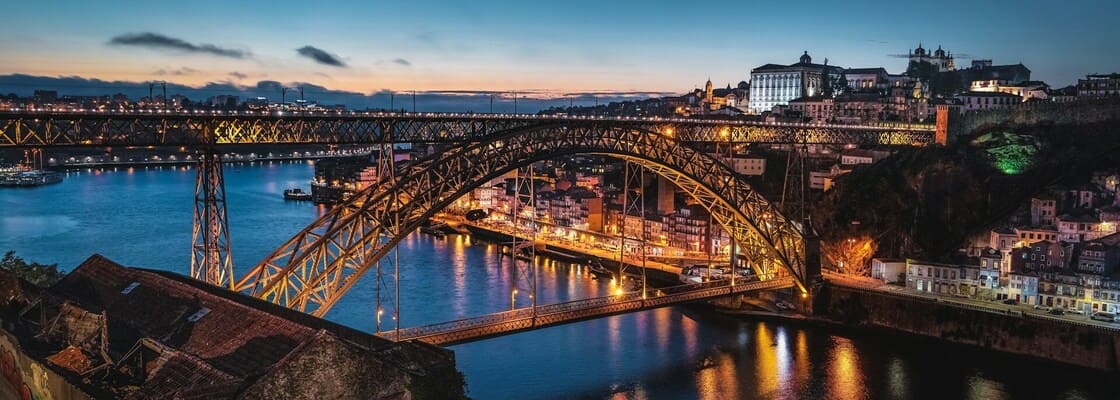The Portugal Digital Nomad Visa, commonly called the D8 Visa, is for remote workers looking to live and work in Portugal. This visa lets digital nomads take advantage of Portugal’s warm climate and affordable cost of living while working remotely for companies or clients outside of Portugal.
In this article, we’ll explore why Portugal continues to be one of the most attractive destinations for digital nomads, including:
- Types of Portugal Digital Nomad Visa
- Application process
- Tax considerations for the Portugal Digital Nomad Visa
- Living in Portugal on a Digital Nomad Visa
Overview of the Portugal D8 Visa
The D8 Visa is a Portugal work visa that lets remote workers from outside the EU live and work in Portugal while continuing to work for clients or employers abroad, too. Simply put, you can only work freelance for companies outside of Portugal or be self-employed.

This visa offers two main residency options: A temporary stay visa for up to one year and a residency visa for longer durations. The most crucial criterion is demonstrating that you earn more than four times the Portuguese minimum wage of €820 monthly. This works out to €3,280.
The Portuguese government plans to increase this to €870 in 2025, making the necessary amount to qualify €3,480.
Types of Portugal Digital Nomad Visas
There are two main types of the Portugal Digital Nomad Visa that you can apply for, depending on the length of your intended stay:
Temporary Stay Visa
The Temporary Stay Visa is a great option for digital nomads who want to live in Portugal for a short time while working remotely. This visa allows you to stay in Portugal for a period of up to a year, providing you with the opportunity to explore the country.
Long-Term Residency Visa
This permit allows digital nomads to live in Portugal for an extended period (longer than a year), with the possibility of renewal and eventually applying for permanent residency or Portuguese citizenship after five years.
Benefits of the Portuguese Digital Nomad Visa
Right to live and work in Portugal: With this temporary stay visa, you can live in Portugal legally for a specific duration, typically up to one year. For comparison, the tourist visa (Schengen visa) allows you to stay in the country for 90 days every three months.
Visa-free travel across the Schengen Area: Portugal is part of the Schengen Area. Digital Nomad Visa holders can travel visa-free to other European Union states.
Access to public services in Portugal: Portuguese Digital Nomad Visa holders can access public services in Portugal, including healthcare, education, and other social benefits.
Pathway to EU citizenship: After five years of legal residence in Portugal, digital nomads can apply for permanent residence and Portuguese citizenship. To become a Portuguese citizen, you must pass a basic Portuguese language test (A2 level) alongside certain other requirements, such as having a clean criminal record.
Family reunification: The long-stay version of the visa allows for family reunification. Portugal Digital Nomad Visa applicants can bring family members, such as the spouse or dependent child, to live in Portugal with them.
Are you eligible for the D8 Visa?
You must meet the following Portugal D8 visa requirements criteria:
- Be a non-EU/EEA/Swiss citizen.
- Have a remote job or freelance work with a company or clients outside Portugal.
- Earn a monthly income of at least four times the Portuguese minimum wage, currently €3,280.
- Provide proof of income through bank statements, contracts, or pay slips.
- Have valid health insurance that covers your stay in Portugal.
D8 Application Process
The application process for the Portugal Digital Nomad Visa involves several steps. Each step must be followed carefully to ensure a smooth and successful application.
Below is a list of the documents needed, but you should also go through the official D8 checklist on VFS Global.

Step 1: Gather required documents
To apply for the D8 Visa, you will need to gather the following documents:
- A valid passport with at least six months of validity remaining
- Proof of sufficient income that is more than four times the Portuguese minimum wage
- Health insurance coverage for your stay in Portugal
- Proof of accommodation in Portugal
- A clean criminal record certificate from your country of residence.
- Portugal D8 Visa application form
- Cover letter explaining the purpose of your Portuguese Digital Nomad Visa application
- Latest tax return or tax receipts
- Latest three payslips
The criteria for proving remote work when applying for the D8 Visa involve providing documentation showing your employment or business activities are conducted remotely and outside of Portugal. These can be demonstrated through:
Employment contract: If a company outside of Portugal employs you, you must provide a valid employment contract. This contract must explicitly state that your remote role is not associated with any physical location within Portugal. Additionally, it should include specific details such as your job title, salary, and the duration of your employment.
Freelance agreement: If you are a freelancer, it’s important to present contracts or agreements with clients primarily located outside of Portugal. These agreements should clearly outline the work’s nature, the contract’s duration, and the payment terms. Furthermore, you may need to provide evidence of multiple ongoing contracts to demonstrate the sustainability of your freelance income.
Proof of business ownership: If you own a business that operates remotely, you must provide documentation to prove your ownership. This includes business registration documents, proof of income, and a description of your business activities. Additionally, the business must be registered outside of Portugal, and you should show that its operations are managed remotely.
Bank statements: To support your application, you may need to provide recent bank statements that show regular payments from your employer, clients, or business activities. This documentation helps confirm the financial viability of your remote work.
Step 2: Schedule an appointment
Once you have gathered all the required documents, schedule an appointment at the nearest Portuguese Consulate or through VFS Global. This appointment is necessary to submit your application and provide biometric data, such as fingerprints.
Step 3: Submit online application (where applicable)
In some cases, you will need to submit an online application through the Portuguese immigration portal. This step involves filling out the application form and uploading digital copies of your documents. This step isn’t necessary when going through VFS Global. However, you must pay the visa fees before attending your appointment.
Step 4: Attend in-person appointment
Attend your scheduled appointment at the consulate or VFS Global office. You will submit your original documents during this appointment, provide biometric data, and pay the visa application fee. The consular officer may also ask questions about your intended stay in Portugal.
Step 5: Wait for processing
After submitting your application, you must wait for it to be processed. The processing time can vary depending on the consulate and the volume of applications, but it generally takes 60 to 90 days. The authorities will review your documents and verify your eligibility during this time.
Step 6: Receive decision and travel to Portugal
Once your application is approved, you will receive your visa, allowing you to travel to Portugal. Upon your arrival, depending on the type of visa you applied for, you may need to register with the local immigration office to obtain your residency permit.
Tips for a smooth application
- Ensure all your documents are up-to-date and translated into Portuguese, if required
- Double-check that your passport is valid enough to cover your stay
- Be prepared to show proof of income that meets the Portuguese minimum wage requirements
- Schedule your appointment as early as possible to avoid long waiting times
- Stay informed about any changes to the visa requirements or process by checking the official Portuguese immigration website
Portugal Digital Nomad Visa Processing Time
The processing time for the Digital Nomad Visa varies by country, but initial visa applications generally take about 60 days to be reviewed and approved.
Once you receive your Portugal Digital Nomad Visa, you will be assigned an appointment date with AIMA to obtain your residence permit. It can take up to four months to schedule this appointment. After the appointment, you can expect to receive your residency permit within 90 days.

Cost of the Portugal Digital Nomad Visa
The visa fees for the Portugal Digital Nomad Visa can vary depending on your country of application and local currency fluctuations. Generally, the application fee for the Digital Nomad Visa is €93, while the fee for the residence permit is €170.
In addition to these fees, potential costs for document authentication through Apostille, translation, and certification of translated documents should be considered. These expenses can differ significantly from one country to another.
Getting a NIF and Portuguese Bank Account
To conduct any business in Portugal and to ensure a smooth application for the D8 Visa, it’s a good idea to open a Portuguese bank account. But before you can do that, you must apply for a NIF, your tax identification number in Portugal.
Getting a NIF
The tax identification number in Portugal, known by the formal name Número de Identificação Fiscal, is an essential requirement for applying for Portugal’s Digital Nomad Visa. This nine-digit taxpayer number is also essential to comply with your tax obligations in the country.
Issued by the Portuguese tax authorities, the NIF number is crucial for various financial transactions, such as signing contracts, opening bank accounts, leasing properties, and conducting other financial activities in Portugal. Foreigners in Portugal must appoint a tax representative, who will apply for an NIF on their behalf.
Opening a Portuguese bank account
Opening a bank account in Portugal is another essential step for Digital Nomads moving to Portugal. You can open a bank account after getting your Portuguese NIF number.
Although a few Portuguese banks offer the convenience of online account opening, most typically mandate in-person visits for banking applications, necessitating a trip to a local branch.
Our ultimate guide to opening a bank account in Portugal will help you navigate the process seamlessly, providing step-by-step instructions, essential documentation requirements, and valuable tips to ensure a smooth and efficient experience tailored to your financial needs.
Tax Implications for Portuguese D8 Visa Holders
When working as a digital nomad in Portugal, you are subject to the same tax obligations as other residents. The tax system operates on a self-assessment basis, meaning it is your responsibility to calculate and fulfill your tax obligations. Keep in mind that the Portuguese tax year runs from January to December.
Paying taxes and complying with tax obligations is mandatory for freelancers in Portugal. These obligations include filing annual income tax returns, paying value-added tax (VAT), and making social security contributions.
If you reside in Portugal for an extended period, you will become a tax resident and will be subject to income taxes. In Portugal, personal income tax rates can reach up to 48 percent.

Tax residency in Portugal: If you spend more than 183 days in Portugal within a calendar year, you may become a tax resident. As a tax resident, you are subject to Portuguese income tax on your income.
End of NHR regime: The Non-Habitual Resident (NHR) program, which offered tax benefits for expats, has ended. However, if you meet certain criteria, it is still possible to enroll in the program.
New NHR regime: The State Budget proposal has introduced a new program known as the Incentivised Tax Status Program (ITS) or the Tax Incentive for Scientific Research and Innovation, which is replacing the NHR tax regime. Those who qualify will benefit from a flat tax rate of 20 percent on eligible professional income arising from Portugal and possibly an exemption on professional foreign-sourced income. They will also have an exemption on the majority of foreign-sourced income, such as dividends, interest, capital gains, and rents. However, unlike under the existing NHR program, this excludes pensions. These benefits will last for a 10-year period.
Income tax rates: Portugal has progressive income tax rates ranging from 13.25 percent (for an income not over €7,703) to 48 percent (for an income over €81,199). Depending on your income level and tax residency status, you may be subject to these rates as a digital nomad.
Double Taxation Agreements: Portugal has double taxation agreements with several countries, which can help prevent double taxation on the same income.
VAT (Value Added Tax): If you provide services to clients within the EU, you may need to consider VAT obligations, which are called IVA in Portugal. The standard VAT rate in Portugal is 23 percnt.
Wealth Tax: Portugal does not have a general wealth tax, but there is a property tax on high-value properties. This may be relevant if you plan to purchase property in Portugal.
D8 Visa Compared to Other Portuguese Visas
The D8 Visa isn’t the only visa that Portugal has to offer, as there are several ways of working, living, or retiring in the country. However, the requirements vary greatly and some visas might be better suited to your situation than others.
Portugal Golden Visa
The Portugal Golden Visa is the country’s primary investment visa. With an investment of at least €250,000, you can get a residency permit that allows EU travel. Your spouse and dependent children can also obtain similar rights. Several investment options include investment funds, job creation, capital investments, and national heritage or research and development donations.
D7 Passive Income Visa
Also known as the Retirement Visa, the Portugal D7 Visa initially targeted passive-income retirees. However, it also suits digital nomads and remote workers if you can prove that you are receiving a passive income and not actively working. Passive monthly income can be generated by a pension, rental income, investments, dividends, or royalties.
D2 Startup Visa
The D2 Visa is aimed at non-EU entrepreneurs and encourages local investment. You must demonstrate an operating company in Portugal or have the resources to establish one. You can provide proof of your resources or a bank loan from a Portuguese bank. After five years of holding the D2 Visa in Portugal, you can apply for a permanent residency permit and/or Portuguese citizenship.
Living in Portugal on a Digital Nomad Visa
Making Portugal your new home can be a rewarding experience. While you are living and working in this beautiful country, there are many things to see and do. We have an ultimate guide on living in Portugal on a D8 Visa that you can check out, but here are some highlights:

Healthcare system access
Portugal offers a public healthcare system accessible to its residents. As a digital nomad, you’ll likely need private health insurance to meet your medical needs. However, once you obtain a residency permit, you may qualify to access the public healthcare system.
Housing options and costs
Housing options for digital nomads in Portugal include renting apartments, sharing housing, or utilizing co-living spaces. The cost of housing varies by city, with Lisbon and Porto being more expensive than smaller towns.
Education opportunities for dependents
If you have children, Portugal provides both public and private education options. Public schools are free, but instruction is conducted in Portuguese. Private international schools are mainly clustered around Lisbon, Porto, and the Algarve but are also available in other major cities and offer education in English or other languages, but they tend to be more expensive.
Expat communities and integration
Portugal boasts a lively expat community, especially in cities such as Lisbon, Porto, and the Algarve region. Participating in local expat groups or attending community events can assist you in integrating and building a support network. Additionally, learning some basic Portuguese can greatly enhance your experience and help you connect with the locals. Portugal also has several co-working spaces, which are great for meeting other expats.
Best Cities for Digital Nomads in Portugal
Portugal might be a small country compared to others in Europe, but that doesn’t mean you’re not spoilt for choice on where to live. There is seemingly a region to suit almost everybody, from warm, sunny beaches to sprawling metropolises and rugged mountain areas.
Lisbon
Lisbon, the capital city, is a popular choice for digital nomads due to its vibrant culture, excellent infrastructure, and numerous co-working spaces. The city offers a mix of historical charm and modern amenities, making it an attractive destination for remote workers.
Porto
Porto, known for its picturesque views and laid-back atmosphere, is another great option for digital nomads. It is more affordable than Lisbon and offers a thriving cultural scene, great food, and a friendly community.
Madeira
Madeira, an autonomous region of Portugal, is a stunning island destination that has become increasingly popular with digital nomads. It offers a relaxed lifestyle, beautiful landscapes, and a dedicated digital nomad village in Ponta do Sol.
Faro
Faro, located in the Algarve region, is known for its beautiful beaches and warm climate. It is a great destination for digital nomads who enjoy outdoor activities and want a more relaxed lifestyle away from the bustling cities.
Braga
Braga is a smaller city with a rich history and a lower cost of living compared to Lisbon and Porto. It is known for its beautiful architecture, friendly community, and growing number of co-working spaces, making it an attractive option for digital nomads.
Drawbacks of Living in Portugal as a Digital Nomad
Despite Portugal’s low cost of living and ranking in second place on the Global Intelligence Unit’s Global Digital Nomad Report by our residency and citizenship division, Global Citizen Solutions, there are also some drawbacks to living in the Iberian Peninsula.
Bureaucratic processes: While Portugal’s Digital Nomad Visa is appealing, navigating bureaucratic procedures can be slow and frustrating. Long processing times and extensive documentation requirements may increase stress.
Cost of living variability: Although more affordable than many Western European countries, certain areas, especially Lisbon and Porto, have experienced rising costs in recent years. High accommodation prices and an influx of expatriates have contributed to increased rental rates.
Seasonal tourism overcrowding: Portugal is a popular tourist destination, leading to overcrowding in some areas during peak seasons, which may affect the quality of life for those who prefer quieter surroundings.
Language barrier: Although English is commonly spoken in cities and tourist areas, the language barrier can be a challenge in more rural or local neighborhoods, especially when handling official matters or socially integrating.
Cultural adjustment: The pace of life in Portugal is generally slower, which may not suit everyone. Adapting to this lifestyle, including longer lunch breaks and more relaxed business practices, can take time.
Frequently Asked Questions about the Portugal Digital Nomad Visa

What is the Portugal Digital Nomad D8 Visa?
The Digital Nomad Visa allows remote workers from outside the EU to live and work in Portugal while continuing to serve clients or employers based abroad.
Who is eligible for the visa?
Non-EU/EEA citizens working remotely as freelancers, employees of foreign companies or who are self-employed, can qualify. Applicants must show a stable monthly income that meets the visa’s minimum financial requirement.
What are the income requirements?
Applicants typically need to demonstrate a monthly income of at least €3,280, which is roughly four times the minimum wage in Portugal. This requirement aims to ensure that nomads can comfortably sustain themselves while living in Portugal.
What is the visa duration?
The Digital Nomad Visa provides two options: A temporary visa for stays of up to one year and a residency permit for longer stays. The residency permit is renewable after two years and can potentially lead to permanent residency, while the temporary visa can also be renewed.
Can I bring my family with me?
Yes, eligible digital nomads can include family members in their application, allowing their spouse, children, or other dependents to live with them in Portugal.
Do I need to pay taxes in Portugal?
Tax obligations vary based on the length of stay and the type of work conducted by digital nomads. Those who stay for more than 183 days may become tax residents.
How long does the application process take?
The application process typically takes several weeks to a few months. Applicants should ensure that all documents are complete and consult with Portuguese immigration services or consulates for processing times specific to their country.
What documents are required for the application?
Key documents include proof of income, remote employment or freelancing contracts, a valid passport, proof of health insurance, and a criminal record check.
Is it possible to apply for permanent residency or citizenship through this visa?
Yes, after five years on a Digital Nomad Visa and continuous residence in Portugal, holders can apply for permanent residency or even Portuguese citizenship if the required eligibility criteria are met, such as language proficiency.
Can I work for Portuguese companies while on the Portugal Digital Nomad Visa?
No, the visa is designed for remote work for companies or clients outside Portugal. To work for Portuguese companies, a different work visa would be required.
Can I apply for the Portugal D8 Visa while on a tourist visa in Portugal?
Generally, Portugal requires you to apply for the D8 Visa from your home country or country of legal residence. Once you enter Portugal on a tourist visa, you may not be allowed to switch to a long-term visa type like the D8 without returning to your home country to apply.
Is there a mandatory minimum stay requirement to maintain the D8 Visa?
Yes, there is a minimum stay requirement. Digital nomads on a D8 Visa must spend at least 16 months in Portugal during the first two years, and absences of over six consecutive months may affect visa validity.
Do I need to have a rental agreement in Portugal before applying for the D8 Visa?
Yes, proof of accommodation is typically required when applying for the D8 Visa. This can be in the form of a rental agreement, property ownership documents, or a letter of invitation from a resident.
What happens if my income drops below the required threshold after obtaining the D8 Visa?
The maintenance of the visa generally depends on your ability to meet the financial requirements. If your income drops below the threshold, this could jeopardize your ability to renew the visa, as you must demonstrate sufficient resources during renewals.
Can I use co-working spaces as proof of work location for the D8 Visa?
While specific guidelines may vary, using a co-working space can often be considered sufficient as a proof of work location, as the D8 Visa is tailored for digital nomads and remote workers.
How long do I need to wait after visa approval before moving to Portugal?
Once your D8 Visa is approved, you typically have 120 days to move to Portugal and register as a resident. During this period, you must arrange your appointment with Portuguese immigration authorities for the residency permit.
Does the D8 Visa allow for multiple entries and exits from Portugal?
Yes, the D8 Visa allows for multiple entries and exits. It is designed for remote workers and digital nomads, granting them flexibility in traveling while residing in Portugal.






